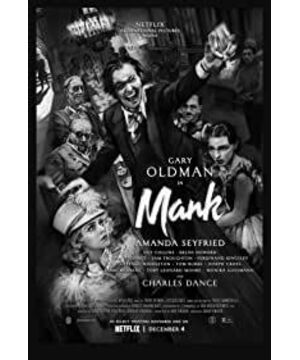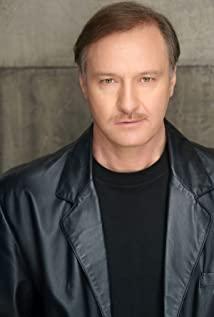[a drunken Herman Mankiewicz sits at the corner of a large dinner table at an elaborate costume party, hosted by William Randolph Hearst and Louis B. Mayer. Instead of tinking on a glass to get the guests' attention, he slashes his glass with a knife. Gasps fill the room as he rises from his seat]
Herman Mankiewicz:
I've got a great idea for a picture, Louis. A picture I just know you're gonna love. It's a modern day version of Quixote!
[Mank realizes his voice echoes through the room, but he continues, circling the table full of silent guests]
Herman Mankiewicz:
Now I know none of you read, but you know what it's about. A deluded old nobleman, who tilts at windmills. So how might we update this story?
Butler:
[whispers to Hearst]
Do you want me to get someone?
William Randolph Hearst:
No.
Herman Mankiewicz:
How about we make our Quixote... a newspaperman? Who else could make a living tilting at windmills? But that's not enough... no, he wants more than readership. He wants more than adulation, he wants love. So, he runs for public office, and because he's notably rich, he wins... no, w-w-w-wait a minute. Notably rich and powerful, can't win over an audience unless notably rich and powerful sees the error of his ways in the final reel. Notably rich and powerful and making no goddamn excuses for it is only admirable in real life. Isn't that right, Louis?
[Mayer glares at Mank as he drunkenly attempts to light his cigarette with the massive fireplace at the end of the room, unsuccessfully. Marion Davies takes a swig of her drink]
Herman Mankiewicz:
So what do we do? Anybody? We give him ideals! Ideals that any dirt-poor, depression-weary audience can identify with. Our Quixote is against crooked trusts, he's for the eight-hour workday, fair income tax, better schools. Why, he's even for government ownership of railroads. And you know what we call those people?
Male Guest:
Communists!
Female Guest:
Anarchists!
Herman Mankiewicz:
No, our Quixote, he's a two-fisted muckraker. In fact, someone predicts that he will one day win the presidency and bring about, get this...
[laughing uncontrollably]
Herman Mankiewicz:
... a socialist revolution!
Louis B. Mayer:
What a bunch of bullshit.
Herman Mankiewicz:
Is it? Tell him, Willie. Tell him.
[Silence]
Herman Mankiewicz:
Upton Sinclair used exactly those words to describe a young William Randolph Hearst.
Louis B. Mayer:
[leaping from his seat]
You miserable bastard!
Herman Mankiewicz:
[bowing]
How do you do?
[Some guests begin to leave the room, but Hearst's and Mayer's eyes stay on Mank]
Herman Mankiewicz:
Our Quixote, he hungers, he thirsts, he lusts for the voters to love him, love him enough to make him president, but they won't. And they don't. How do you suppose that could happen? Could it be because, in their hearts, they know he values power over people?
[More guests leave as Mank approaches Hearst, still seated]
Herman Mankiewicz:
Disillusioned in Congress, he authors not one single piece of legislation in two terms. Can you believe that? That'll take some writing. Placed in nomination for president... it's too radical for the boys in the back, his bid goes nowhere! But we're doing something. We're building sympathy!
[Even more guests leave]
Herman Mankiewicz:
Rejected, he flees to lotus land, where his faithful troll, Sancho, has prepared a mythical kingdom for...
[Mank eyes Davies, stopping himself totally]
Herman Mankiewicz:
Wait a minute. I forgot the love interest! Her name: Dulcinea.
[Every remaining head in the room turns to Davies]
Herman Mankiewicz:
Funny, adventurous, smarter than she acts. Ah, she's a... she's a showgirl! Beneath his social stratum, but that's okay because true love on the big screens, we all know is blind. And she... well, she loves him, too. So he takes her away to his m-mythical kingdom,
[to butler]
Herman Mankiewicz:
can I get a bicarb?
[back to the guests]
Herman Mankiewicz:
Now, along comes nemesis, that's Greek for any guy in a black hat, nemesis runs for governor, and he's a shoo-in to win. Why?
[points to Hearst]
Herman Mankiewicz:
Because he's EXACTLY what our Don used to be! An idealist, ya get it? And not only that, nemesis is the same guy who once predicted that our Quixote would one day preside over a socialist revolution. Our Quixote looks into the mirror of his youth and decides to break this glass, a maddening reminder of who he once was. Assisted by his faithful Sancho
[pointing to Mayer]
Herman Mankiewicz:
and armed w-with all the black magic at his command, he does just this. Destroying, in the process, not one man... but two.
[Hearst is clearly furious, but maintains his composure]
Herman Mankiewicz:
Well, what do ya think, Louis? Hm? Do ya think it'll play?
[Mank finally belches onto the floor. Any guest who hasn't already left does so]
Herman Mankiewicz:
Don't worry, folks. The white wine came up with the fish!











